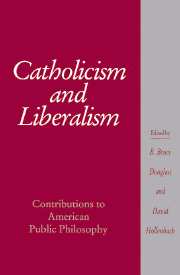Book contents
- Frontmatter
- Contents
- List of contributors
- Preface
- Introduction
- PART I HISTORICAL CONFLICTS AND DEVELOPMENTS
- PART II NEW ENCOUNTERS AND THEORETICAL RECONSTRUCTIONS
- 5 A communitarian reconstruction of human rights: contributions from Catholic tradition
- 6 Catholic social thought, the city, and liberal America
- 7 The common good and the open society
- 8 Catholic classics in American liberal culture
- PART III PRACTICES AND INSTITUTIONS
- Afterword: a community of freedom
- Index
5 - A communitarian reconstruction of human rights: contributions from Catholic tradition
Published online by Cambridge University Press: 19 February 2010
- Frontmatter
- Contents
- List of contributors
- Preface
- Introduction
- PART I HISTORICAL CONFLICTS AND DEVELOPMENTS
- PART II NEW ENCOUNTERS AND THEORETICAL RECONSTRUCTIONS
- 5 A communitarian reconstruction of human rights: contributions from Catholic tradition
- 6 Catholic social thought, the city, and liberal America
- 7 The common good and the open society
- 8 Catholic classics in American liberal culture
- PART III PRACTICES AND INSTITUTIONS
- Afterword: a community of freedom
- Index
Summary
There is considerable irony in the relationship between Roman Catholic thought and recent discussions of human rights. During the last century and a half, the Roman Catholic church has moved from strong opposition to the rights championed by liberal thinkers of the eighteenth and nineteenth centuries to the position of one of the leading institutional advocates for human rights on the world stage today. In 1832, for example, Pope Gregory XVI had declared that the right to freedom of conscience is an “insanity” (deliramentum) The dramatic change is evident if one juxtaposes this condemnation with the Second Vatican Council's declaration that “the right to religious freedom has its foundation in the very dignity of the human person, as this dignity is known through the revealed word of God and by reason itself.” Indeed Vatican II linked its support for human rights with the very core of Christian faith when it declared that “by virtue of the gospel committed to it, the Church proclaims the rights of the human person.”
Thus in a relatively short period, the Catholic church moved from being a staunch opponent of liberal rights and freedoms to activist engagement in the struggle for human rights from Poland to the Philippines, from Central America to South Africa. This shift is one of the most dramatic reversals in the long history of the Catholic tradition. Despite this clear volte-face, however, this essay will argue that the changed stance of the church toward the modern idea of rights was not the result of an across-the-board acceptance of classical liberal thinking.
- Type
- Chapter
- Information
- Catholicism and LiberalismContributions to American Public Policy, pp. 127 - 150Publisher: Cambridge University PressPrint publication year: 1994
- 4
- Cited by



